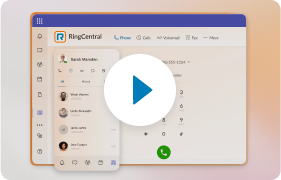With growing patient numbers, complex health issues, and the need for coordinated care, staff efficiency, effectiveness and connectivity are critical factors to success. RingCentral centralizes its AI-powered communication tools, unified communications and contact center, and all channels, including voice calling, video meetings, and messaging, on a common communications platform. A platform-based approach that spans across a highly-reliable global network simply improves internal and external communications, ultimately leading to better healthcare services. As you will see, this approach not only boosts productivity but also supports better health outcomes for patients.
The importance of platform-based communications in healthcare
We all understand the sheer complexity baked into the business of healthcare – navigating healthcare systems involves countless interactions between patients, providers, and payers. Likewise, we have all likely experienced the delays, errors, and inefficiencies in treatment and struggled with isolated or disjointed communications between these three stakeholders. The effects of poor communications can be much more dramatic. According to one study, communication failures in healthcare are a leading cause (nearly 70%) of sentinel events that can result in death, permanent harm, or severe temporary harm to the patient.
Platform-based communications or centralizing all communication channels onto a single platform, is often the most effective way to improve collaboration and data sharing. Ultimately, a communications platform directly speeds decision-making, cuts down on redundancies, and ensures all key stakeholders have access to important information when they need it.
The key components and benefits of RingCentral’s unified communications
RingCentral leverages its AI-powered platform to offer a network-based approach to healthcare communication. This approach integrates phone, messaging, video, contact center, and virtual events into a single, unified system. Let’s explore the key components of RingCentral’s network-based approach and their impact on healthcare efficiency.
- Unified communication system
A study in the Journal of Medical Internet Research highlights that integrating communication channels into a single platform can reduce response times by 30% and improve overall care coordination (Gawande, 2018).
At the core of RingCentral’s approach is the unification of various communication channels. RingCentral’s unified platform ensures that all interactions – whether via phone, video, or messaging – are seamlessly connected and captured, enabling healthcare providers to access and share information effortlessly. The RingCentral platform eliminates the need to manage multiple discrete collaboration platforms, reducing complexity and enhancing operational efficiency.
- Real-time collaboration and data sharing
According to research published in Health Affairs, improved collaboration can reduce medical errors by up to 50% (Mitchell et al., 2016). Effective collaboration among healthcare teams is essential for delivering coordinated care. RingCentral’s network-based approach facilitates real-time collaboration through AI-powered team messaging and file-sharing capabilities. By enabling healthcare professionals to communicate and share data instantly, RingCentral ensures that everyone is on the same page, leading to faster decision-making and better patient outcomes.
- Enhanced patient engagement
Patient engagement is a critical component of modern healthcare. RingCentral’s platform enhances patient engagement by providing multiple channels for communication, including phone, messaging, and video. Multi-channel communication strategies can increase patient satisfaction and adherence to treatment plans by 20%,according to a study in the Journal of Medical Systems (Topol, 2019). With RingCentral, patients can easily reach their providers, receive timely updates, and participate in virtual consultations, leading to more proactive and engaged patient care.
- AI-powered automation and insights
Artificial Intelligence (AI) plays a central role in RingCentral’s communications platform, offering automation and data-driven insights that enhance efficiency. AI-powered features such as real-time call transcription, automated note-taking, and personalized conversation insights reduce the administrative burden on healthcare providers. By automating routine tasks and providing actionable insights, RingCentral enables healthcare professionals to focus more on patient care and less on administrative duties.
- Scalability and flexibility
Healthcare organizations vary in size and scope, from small clinics to large hospital networks. RingCentral’s platform is designed to be scalable and flexible, catering to the needs of organizations of all sizes with equal access to a powerful set of features and capabilities. This scalability ensures that as healthcare providers grow and evolve, their communication infrastructure can adapt accordingly.
The academic perspective on unified communications in the healthcare transformation
Academic research supports the efficacy of a platform-based approach in healthcare communications. Additionally, a review in the Journal of Health Organization and Management emphasized that communication platforms enhance organizational agility, allowing healthcare providers to respond more effectively to changing patient needs and external pressures.
The future of unified communications in healthcare systems
The future of healthcare is ultimately rooted in improving communications between patient, provider and payer. As AI advances, we will also see more sophisticated tools that improve communication and patient care. Predictive analytics, natural language processing, and machine learning will lead to more personalized and proactive healthcare treatments.
RingCentral is dedicated to driving this change by constantly improving its solutions and integrating with partners to support the evolving needs of healthcare providers. By building a more connected and efficient communication platform, RingCentral is helping to ensure that healthcare providers can deliver top-quality care.
Here’s how unified communication platforms can impact the future of healthcare:
- Improved collaboration: Communication platforms enable seamless communication between healthcare teams, reducing delays and improving coordination in patient care.
- Enhanced patient experience: Patients can easily connect with providers through their preferred channels (phone, video, chat), leading to better accessibility and satisfaction.
- Streamlined operations: By integrating communication tools with critical electronic health record (EHR) applications, healthcare providers can reduce administrative tasks and focus more on patient care.
- Real-time data sharing: Unified platforms allow for instant sharing of critical patient information, leading to faster decision-making and better outcomes.
- Cost efficiency: By consolidating communication tools into one platform, healthcare organizations can reduce costs associated with multiple systems and improve overall operational efficiency.
- Scalability: A unified platform, built on top of a global network, can easily scale to meet the growing needs of healthcare providers, adapting to new technologies and demands.
- Increased security: Centralizing communications on a unified platform actually narrows the number of attack vectors a hacker can use to gain access to critical systems. In addition, enhanced security features can be employed platform-wide, protecting sensitive patient data and ensuring compliance with healthcare regulations.
- AI integration: Communication platforms can incorporate AI-driven tools, such as chatbots and predictive analytics, across all channels to further enhance patient care and operational efficiency.
Conclusion
A platform-based approach to healthcare communication is essential for modern healthcare systems. RingCentral is leading this transformation with AI-powered solutions that help healthcare providers improve efficiency, patient care, and operations. As healthcare continues to evolve, integrating these communication platforms will play a key role in creating more connected and efficient systems.
RingCentral’s solutions offer real-time communication, streamlined workflows, and enhanced data sharing, making it easier for healthcare teams to collaborate and deliver top-notch care. By simplifying communication, RingCentral helps reduce errors, improve response times, and ensure critical information is always accessible. Visit our website for more details on how RingCentral can support your healthcare organization.
Originally published Oct 16, 2024












